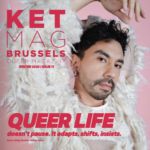The recent Miss Belgium pageant has offered notable outcomes that align with broader discussions on diversity and representation in societal institutions, including beauty contests. This year’s event highlighted significant developments that may interest observers from various communities, including feminist and LGBTQIA+ circles.
Lennie Blockmans, a trans woman who recently featured on the cover of Ket Magazine, was awarded Miss Congeniality by her fellow contestants. This title, reflective of peer recognition, suggests a growing acceptance and inclusivity within the pageant for individuals of diverse gender identities. Blockmans’ recognition in the competition is a step towards wider representation in public platforms, which may resonate with ongoing discussions about visibility and equality for the LGBTQIA+ community.
Miss Belgium 2024 : The multifaceted nature of beauty
In the same competition, Kenza Johanna Ameloot, a 22-year-old with a mixed Rwandan-Belgian heritage, clinched the title of Miss Belgium. Ameloot, an international business student and model, embodies a blend of cultural identities, reflecting the multifaceted nature of beauty. Her victory, succeeding Emilie Vansteenkiste as Miss België and Miss Universe Belgium, brings to the forefront the evolving criteria within beauty pageants that appear to value diversity and intellect alongside traditional notions of aesthetics.
These outcomes from the Miss Belgium pageant might be seen as indicative of a gradual shift in the landscape of beauty contests, toward embracing a broader spectrum of backgrounds and stories. The recognition of Blockmans and the crowning of Ameloot can be viewed in the context of ongoing dialogues about what constitutes beauty and who is represented in such competitions.
Relevance of beauty pageants
While the achievements of Blockmans and Ameloot are noteworthy within the context of their personal journeys and the communities they represent, they also prompt reflection on the role and relevance of beauty pageants in contemporary society. For some, these developments may highlight progress in inclusivity and representation. For others, they may raise questions about the inherent dynamics of beauty competitions and their place within feminist and progressive discourses.
As discussions about diversity, representation, and equality continue to evolve, the outcomes of the Miss Belgium pageant offer a moment for contemplation on how traditional institutions are responding to these critical conversations. Whether viewed as milestones or as points of debate, the recognitions of Blockmans and Ameloot contribute to the broader discourse on inclusivity, highlighting the complexities and ongoing nature of societal progress.
Photo – Instagram : @Lennie_fromtheblock
You may also like
-

The New KET Is Out: Queer Brussels Keeps Moving
KET Magazine Issue 11 is out now and available in LGBTQIA+ safe spaces across Brussels,
-

Brussels Art Guide 2026: Mapping a Vibrant Contemporary Scene
Brussels is once again putting its contemporary art scene in the spotlight with the new
-

What is Sex-Positive Belgium?
Sex-Positive Belgium is a growing, real-life community of open-minded people who embrace a sex-positive philosophy. It welcomes
-

“Bi+ Equal: Europe’s First Platform Uniting Bi+ Communities Across Borders”
Bi+ Equal is the first-ever bi+ structure at the European level, a new platform created
-

“From Borders to Belonging: How Arc-en-Ciel International Guides LGBTQIA+ Migrants to Safety and Community”
Arc-en-Ciel International Rainbow (AIR) is an online platform created for and with LGBTQIA+ migrants, refugees

